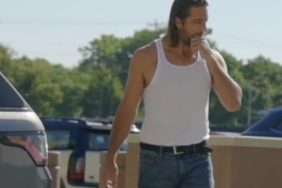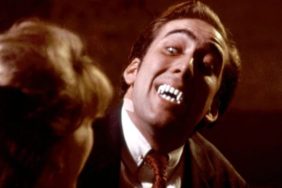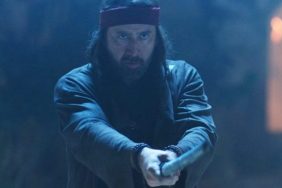When the time comes to interview Nicolas Cage, don’t start the interview with a huge cup of powerful lapsang souchong tea. You become Nicolas Cage. And Nicolas Cage becomes a mellow dude who tries to pull you back a little bit.
In Larry Charles’ Army of One, the legendary Nicolas Cage plays Gary Faulkner, the real-life charismatic and slightly unbalanced American who, upon orders from God on high, went to Afghanistan to hunt down and capture (but not kill) Osama bin Laden. Faulkner’s life is, one must admit, and interesting one, and his journey took him down some odd paths; he tried sailing across the Atlantic, for instance, despite not knowing how to sail.
Nicolas Cage, a multi-faceted performer to say the least, was allowed to be funny for the first time in many years in Army of One, playing Faulkner as a loud, chattery, weird, yet very alluring local kook whose quest seems misguided and laudable all at once. Cage recently talked with Crave about working on the film, the comedians he had the honor of working with, the magnetism of Gary Faulkner, and how great to was to be in a comedy again.
Army of One will be in limited theaters and available on Digital HD on November 4th and on VOD, DVD, and Blu-ray on November 15th.
Crave: I haven’t seen you play a character this broadly funny in quite some time.
Nicolas Cage: It’s interesting you mention that, and I agree. I did Raising Arizona. I did Honeymoon in Vegas, It Could Happen to You, Moonstruck, and other comedies. And I don’t know why it’s sort of taken this long to get back to a comedy. I guess it took a comedy genius like Larry Charles to remember that that’s one of the things that I can also do, and I was just happy to have a chance to show that again.
Gary Faulkner is a real person, but he seems like he’s someone we all know one of. He reminded me of a happy version of Walter from The Big Lebowski.
That’s funny you should say that. Because I was trying to think about if there were any characters that I played that might even come close to this gonzo energy of Gary Faulkner in Army of One, and I thought of another Coens’ movie, which was Raising Arizona. H.I. McDunnough. And that’s only beginning to scratch the surface of the madness that Gary has in Army of One. But, yeah, there is a kind of gonzo energy to Army of One that is a little reminiscent of H.I. McDunnough. I hadn’t thought of The Big Lebowski much, but I can see where you might make that parallel.
How much exposure did you have with the real Gary Faulkner?
I had three hours on videotape interviewing him. And I would watch them on a daily basis, and there was a lot to go through. And I really just sort of asked him questions about his childhood, about his purpose, his mission, how it happened. And he went into detail about his relationship with God. He’s a high-energy guy. He’s very excitable. He doesn’t stop talking. So I knew that, with Gary, I was going to have to get into a lot of dialogue. Most of it was scripted, a lot of it was improvised. But I knew it was going to be a lot of output from this character, and a very high level of energy. Manic, almost.
And by the end of it, I was wiped out. I was totally wiped out. So much so that, at the end of it, when Paul Schrader called me while I was filming Army of One – to do Dog Eat Dog, he asked me to play Mad Dog – and I said I just can’t do this again. Let me play the straight guy on this one at least!

Anchor Bay Entertainment
You said some of the dialogue was improved. I sensed that when you namechecked yourself.
[Laughs.] Most of the dialogue with Wendi [McLendon-Covey] was improvised. And she’s such a talented comedienne, you could throw a curveball at her, and she’d throw a million curveballs back, and she’s 100% on pointe. That moment with the Con Air reference was kind of me sort of taking stock of Gary and how Gary saw himself. It was entirely likely that he went to see Con Air – and Cameron Poe [Cage’s character from Con Air] has the same hair as Gary Faulkner does. It’s long and pulled back sometimes. Even though his hair is gray, I can see that he might, at one point, see himself as a badass like Cameron Poe.
But what I was really trying to do was go Being John Malkovich. Go a little meta with it. In that one moment, go kind of cubist, you know? Layer things on top of things. Go outside-the-movie-then-inside-the-movie with things.
The film is a comedy, and Gary Faulkner is a funny guy, but the film seems to be laughing at him a little bit.
Yeah. One of the things I love about Larry Charles as a filmmaker is that he’s not always about the comedy. He was really trying to find the tragic quality of the character as well. As far as making fun of that character, the situations are so extreme and so kind of absurdist (even though they actually happened), that it’s possible not to have a little schadenfreude with it.

Anchor Bay Entertainment
You were very good at capturing the character of Gary Faulkner, especially his weird optimistic magnetism.
I think that’s the sort of thing that can happen. You scratch your head sometimes wondering how some of these people get away with the things they get away with. Then you realize it could be the sheer personality of someone that gets them through customs. Or gets them as close to Osama bin Laden as anyone had been yet. Or closer to him than even the CIA or the FBI or whomever. It’s kind of hard to believe, but this actually happened! He actually got very close.
How much of the film is factual, and which parts were completely fabricated?
I think that most of it is factual as it pertains to what Gary told us is factual. The truth is, a lot of what Gary told us, Larry and I were like “really? Really, man? Like for real?” So we were wondering, but still we just laid it out the way he said it went down. Gary didn’t get that specific as to how God appeared to him. He did talk about his relationship with God. The balloon and the stick [which were Faulkner’s holy totems]. This was a definite calling, and he had this epiphany, and he was on this mission, which was from God. But I think Larry was the one who brought in the idea for Russell [Brand] as God and having the English accent and all that.
Russell was an absolute pleasure to work with. That is is as formidable and as charismatic and anyone I’ve ever worked with, if not more, and I really enjoyed my time with him.

Anchor Bay Entertainment
You got to work with a lot of notable comedians, in fact. Paul Scheer, Rainn Wilson, Will Sasso…
You know what it is, I attribute all of that to Larry Charles. Larry is a maestro of comedy, and he’s highly, highly revered in that genre, and I think the fact that I got to work with them is simply because they all wanted to work with Larry. I got to work with Russell, I got to work with Wendi, and I got to work with Rainn because of Larry.
What was the first record you bought with your own money?
[Long pause] It was… I want to remember the name of it. It was ELO. What’s the one with the beautiful jukebox UFO, and the airplane is going into it? It was one of the early ELO records. I juts liked the record cover. [Ed. It was 1977’s Out of the Blue]. Also The Doors. The first Doors album.
Top image: Anchor Bay Entertainment
Witney Seibold is a longtime contributor to the CraveOnline Film Channel, and the co-host of The B-Movies Podcast and Canceled Too Soon. He also contributes to Legion of Leia and to Blumhouse. You can follow him on “The Twitter” at @WitneySeibold, where he is slowly losing his mind.








